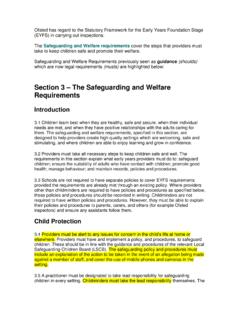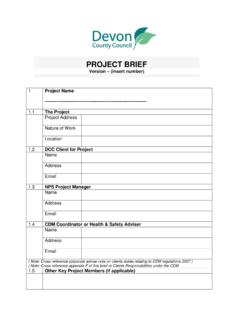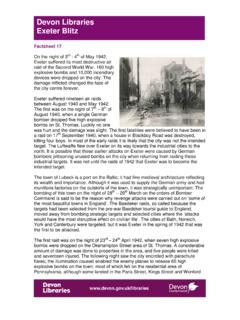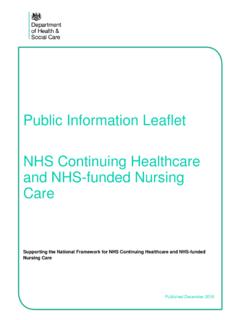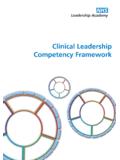Transcription of NHS Continuing Healthcare Checklist - Devon
1 NHS Continuing Healthcare Checklist November 2012 (Revised) NHS Continuing Healthcare Checklist 2 DH INFORMATION READER BOXP olicyClinicalEstatesHR / WorkforceCommissioner DevelopmentIM & TManagementProvider DevelopmentFinancePlanning / PerformanceImprovement and EfficiencySocial Care / Partnership WorkingDocument PurposeGateway ReferenceTitleAuthorPublication DateTarget AudienceCirculation ListDescriptionCross RefSuperseded DocsAction RequiredTimingContact Recipient's UseNHS Continuing Healthcare Checklist November 2012 (Revised)LS2 7UE0 NHS Continuing Healthcare Policy TeamQuarry HouseQuarry HillLeedsThe NHS Continuing Healthcare Checklist is a tool to help practitioners identify people who need a full assessment for NHS Continuing implementation from 1 April 2013DH28 November 2012 PCT Cluster CEs, NHS Trust CEs, SHA Cluster CEs, Care Trust CEs, Foundation Trust CEs , Medical Directors, Directors of Nursing, Local Authority CEs, Directors of Adult SSs, PCT Cluster Chairs, NHS Trust Board Chairs, Special HA CEs, Directors of Finance, GPs, Emergency Care Leads, Clinical Commissioning Groups, NHS Commissioning BoardCommunications LeadsNational Framework for NHS Continuing Healthcare and NHS-funded Nursing Care November 2012 (Revised), Decision Support Tool for NHS Continuing Healthcare November 2012 (Revised) and Fast Track Pathway Tool for NHS Continuing Healthcare November 2012 (Revised)
2 NHS Continuing Healthcare Checklist July 2009 This is the NHS Continuing Healthcare Checklist to be used from 1 April 2013 NHS Continuing Healthcare Checklist 3 NHS Continuing Healthcare Checklist November 2012 (Revised) NHS Continuing Healthcare Checklist 4 Contents How to use this Completion of the NHS Continuing Healthcare Needs Continuing Healthcare Checklist 5 NHS Continuing Healthcare Checklist November 2012 (Revised) Notes 1. Clinical commissioning groups (CCGs) and the NHS Commissioning Board (the Board) will assume responsibilities for NHS Continuing Healthcare (NHS CHC) from 1 April 2013. 2. The Board will assume commissioning responsibilities for some specified groups of people (for example, prisoners and military personnel). It therefore follows that the Board will have statutory responsibility for commissioning NHS CHC, where necessary, for those groups for whom it has commissioning responsibility.
3 This will include case co-ordination, arranging completion of the decision support tool, decision-making, arranging appropriate care packages, providing or ensuring the provision of case management support and monitoring and reviewing the needs of individuals. It will also include reviewing decisions with regards to eligibility where an individual wishes to challenge that decision. 3. Where an application is made for a review of a decision made by the Board, it must ensure that in organising a review of that decision, it makes appropriate arrangements to do so, so as to avoid any conflict of interest. 4. Throughout the Checklist where a CCG is referred to, the responsibilities will also apply to the Board (in these limited circumstances). 5. This Checklist is a tool to help practitioners identify people who need a full assessment for NHS Continuing Healthcare . Please note that referral for assessment for NHS Continuing Healthcare is not an indication of the outcome of the eligibility decision.
4 This fact should also be communicated to the individual and, where appropriate, their representative. 6. The Checklist is based on the Decision Support Tool for NHS Continuing Healthcare . The notes to the Decision Support Tool and the National Framework for NHS Continuing Healthcare and NHS-funded Nursing Care guidance will aid understanding of this tool. Practitioners who use this tool should have received suitable training. 7. The aim is to allow a variety of people, in a variety of settings, to refer individuals for a full assessment for NHS Continuing Healthcare . For example, the tool could form part of the discharge pathway from hospital; a GP or nurse could use it in an individual s home; and social services workers could use it when carrying out a community care assessment. This list is not exhaustive, and in some cases it may be appropriate for more than one person to be involved. It is for each organisation to decide for itself which are the most appropriate staff to participate in the completion of a Checklist .
5 However, it must be borne in mind that the intention is for the Checklist to be completed as part of the wider process of assessing or reviewing an individual s needs. Therefore, it is expected that all staff in roles where they are likely to be involved in assessing or reviewing needs should have completion of Checklists identified as part of their role and receive appropriate training. 8. Individuals may request an assessment for NHS Continuing Healthcare . In these circumstances, the organisation receiving the request should make the appropriate arrangements for a Checklist to be completed. NHS Continuing Healthcare Checklist 6 9. All staff who apply the Checklist will need to be familiar with the principles of the National Framework for Continuing Healthcare and NHS-funded Nursing Care and with the Decision Support Tool for NHS Continuing Healthcare . How to use this tool 10.
6 Before applying the Checklist , it is necessary to ensure that the individual and (where appropriate) their representative understand that completing the Checklist is not an indication of the likelihood that the individual will necessarily be determined as being eligible for NHS Continuing Healthcare . 11. The individual should be informed that the Checklist is to be completed and should have the process for completion explained to them. The individual and (where appropriate) their representative should be supported to play a full role in the process and should be given an opportunity to contribute their views about their needs. Decisions and rationales should be transparent from the outset. 12. As with any examination or treatment, the individual s informed consent should be obtained before the process of completing the Checklist commences. Further advice on consent issues can be found at: 13.
7 It should be made explicit to the individual whether their consent is being sought for a specific aspect of the eligibility process ( completion of the Checklist ) or for the full process. It should also be noted that individuals may withdraw their consent at any time in the process. 14. If there is a concern that the individual may not have capacity to give their consent, this should be determined in accordance with the Mental Capacity Act 2005 and the associated code of practice. Anyone who completes a Checklist should be particularly aware of the five principles of the Act: A presumption of capacity: A person must be assumed to have capacity unless it is established that they lack capacity. Individuals being supported to make their own decisions: A person is not to be treated as unable to make a decision unless all practicable steps to help him or her to do so have been taken without success.
8 Unwise decisions: A person is not to be treated as unable to make a decision merely because he makes an unwise decision. Best interests: An act done, or decision made, under this Act for or on behalf of a person who lacks capacity must be done, or made, in his or her best interests. Least restrictive option: Before the act is done, or the decision is made, regard must be had to whether the purpose for which it is needed can be as effectively achieved in a way that is less restrictive of the person s rights and freedom of action. NHS Continuing Healthcare Checklist 7 15. It must also be borne in mind that consideration of capacity is specific to both the decision to be made and the time when it is made the fact that a person may be considered to lack capacity to make a particular decision should not be used as a reason to consider that they cannot make any decisions.
9 Equally, the fact that a person was considered to lack capacity to make a specific decision on a given date should not be a reason for assuming that they lack capacity to make a similar decision on another date. 16. If the person lacks the mental capacity to either give or refuse consent to the use of the Checklist , a best interests decision, taking the individual s previously expressed views into account, should be taken (and recorded) as to whether or not to proceed. Those making the decision should bear in mind the expectation that everyone who might meet the Checklist threshold should have this opportunity. A third party cannot give or refuse consent for an assessment of eligibility for NHS Continuing Healthcare on behalf of a person who lacks capacity, unless they have a valid and applicable Lasting Power of Attorney (Welfare) or they have been appointed a Welfare Deputy by the Court of Protection.
10 Before making a best interest decision as to whether or not to proceed with the completion of the Checklist the assessor should be mindful of their duty to consult with appropriate third parties. This is particularly important if the decision is not to complete a Checklist . 17. Further information on consent and mental capacity can be found in paragraphs 48 - 51 of the National Framework for NHS Continuing Healthcare and NHS-funded Nursing Care. Completion of the Checklist 18. In an acute hospital setting, the Checklist should not be completed until the individual s needs on discharge are clear. 19. Please compare the descriptions of need to the needs of the individual and select level A, B or C, as appropriate, for each domain. Consider all the descriptions and select the one that most closely matches the individual. If the needs of the individual are the same or greater than anything in the A column, then A should be selected.
